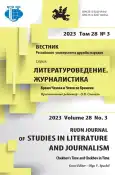Медицина как профессия в самовосприятии писателя: на примере А.П. Чехова (1860-1904) и Х. Рисаля (1861-1896)
- Авторы: Липке Ш.1
-
Учреждения:
- Российский университет дружбы народов
- Выпуск: Том 28, № 3 (2023): Время Чехова и Чехов во Времени
- Страницы: 482-489
- Раздел: Литературоведение
- URL: https://journal-vniispk.ru/2312-9220/article/view/319062
- DOI: https://doi.org/10.22363/2312-9220-2023-28-3-482-489
- EDN: https://elibrary.ru/MVHJGU
- ID: 319062
Цитировать
Аннотация
Сравнивается деятельность врача и писателя А.П. Чехова с его филиппинским собратом и современником Х. Рисалем с целью выявить, каким образом для обоих творчество связано с медицинской деятельностью. Произведения обоих демонстрируют, что для них важен прогресс. Чехов в своем творчестве неоднократно показывает последствия невежества, а также отсутствия гигиены и должной заботы о здоровье. В частности, в повести «Мужики» он описывает пьянство, грязь и невежество, вызванные нищетой. При этом он не готов связывать социально-политические высказывания напрямую с творчеством. Кроме того, после поездки на о. Сахалин он отказывается осуждать героев, даже если описывает их грязными и невежественными. Как общественный деятель он заботится о больных, оказывая им помощь, в частности жертвам эпидемий, и об учреждении сельских школ. Рисаль, в свою очередь, стал офтальмологом, чтобы вылечить слепоту матери, приобретенную во время ее несправедливого заключения; а писателем он стал, чтобы лечить «социальный рак» своей родной страны - невежество. При этом он сталкивается с тем, что испанские власти мешают образованию народа. Поэтому вопрос о первичности образования или политического освобождения страны для него остается открытым вплоть до ссылки и казни. Таким образом, для Чехова быть врачом, быть общественным деятелем и быть писателем - разные виды деятельности, хотя и тесно между собой связанные. Рисаль же стал писателем, чтобы лечить социум своей родины. Тем не менее оба являются примерами того, как писатель, сочетая медицину, творчество и прогрессивную общественную деятельность, осуществляет названный Ю.М. Лотманом идеал «жизнестроительства».
Ключевые слова
Об авторах
Штефан Липке
Российский университет дружбы народов
Автор, ответственный за переписку.
Email: stephanlipkesj@gmail.com
ORCID iD: 0000-0001-9072-6945
кандидат филологических наук, доцент, доцент кафедры истории философии, факультет гуманитарных и социальных наук
Российская Федерация, 117198, Москва, ул. Миклухо-Маклая, д. 6Список литературы
- Albert, D.M., Miller, J.W., Azar, D.T., & Blodi, B.A. (2008). Principles and practice of ophthalmology. Amsterdam: Elsevier Health Sciences.
- Chekhov, A.P. (1974-1983). The full collection of works and letters. Moscow: Nauka Publ. (In Russ.)
- Coates, A. (1968). Rizal: Philippine nationalist and martyr. Hong Kong: Oxford University Press.
- Ermilov, V.V. (1949). Anton Pavlovich Chekhov, 1860-1904. Moscow: Sovetskii Pisatel' Publ. (In Russ.)
- Freise, M. (1997). Die Prosa Anton Čechovs: Eine Untersuchung im Ausgang von Einzelanalysen. Amsterdam, Atlanta, GA: Rodopi.
- Geyzer, I.M. (1955). Chekhov and medicine. The Yalta Chekhov Lectures 1954: Essays, Research Papers (pp. 136-154). Moscow: Gosudarstvennaya Biblioteka SSSR Imeni V.I. Lenina Publ. (In Russ.)
- Gibbs, E.A. (1960). Rizal in Dapitan: A story based on the life of José Rizal during his exile in Dapitan. Manila: University Book Supply.
- Grossman, L. (1967). The naturalism of Chekhov. Chekhov: A Collection of Critical Essays. Eaglewood Cliffs, N. J.: Prentice Hall.
- Kataev, V.B. (1979). Chekhov’s prose: Problems of interpretation. Moscow: Moscow University Publ. (In Russ.)
- Lipke, S. (2019). Anthropology in A.P. Chekhov’s fictional prose: The human being’s ineffability and the architectonics of the work. Moscow: Institut sv. Fomy Publ. (In Russ.)
- Lipke, S. (2020). Realismo macabro en la novela “Noli me tangere” de José Rizal a la luz de la poema “Almas muertas” de Nikolai Gogol. Acta Literaria, 61, 39-55. http://doi.org/10.29393/AL61-9RMSL10009
- Lotman, Yu.M. (1995). Pushkin. St. Petersburg: Iskusstvo-SPb Publ. (In Russ.)
- Novikova, Ye.G. (2012). World tour of A.P. Chekhov as journey to Sakhalin: Writer’s viewpoint. Tomsk State University Herald: Philology, (3), 75-81. (In Russ.)
- Rayfield, D. (1999). Understanding Chekhov. Madison: University of Wisconsin Press.
- Rizal, J. (1930-1938). Epistolario Rizalino. Manila: Bureau of Printing.
- Rizal, J. (1961). Sa mga Kababayang Dalaga sa Malolos. Escritos de José Rizal. Tomo VII. Escritos políticos e históricos (pp. 55-65). Manila: Comisión Nacional del Centenario de José Rizal.
- Rizal, J. (1983). Noli me tangere. La Habana: Editorial Arte y Literatura.
- Rizal, J. (1984). El Filibusterismo. La Habana: Editorial Arte y Literatura.
- Rodriguez, E.B., & Russell, Ch.E. (1923). The hero of the Filipinos: The story of José Rizal, poet, patriot and martyr. New York: Century.
- San Juan Jr., E. (1971). The radical tradition in Philippine literature. Quezon City: Manlapaz.
- San Juan Jr., E. (1984). Towards a people’s literature: essays in the dialectics of praxis and contradiction in Philippine writing. Quezon City: University of the Philippines Press.
- Schumacher, J.N. (1991). The making of a nation: Essays on nineteenth-century Filipino nationalism. Manila: Ateneo University Press.
- Simmons, E.J. (1963). Chekhov: A biography. London: Jonathan Cape.
- Thiergen, P. (2011). “Poets lie a lot”: Chekhov, or Love for the mask. Chekhov and Time: Collection of Essays (pp. 7-27). Tomsk: Tomsk University Publ. (In Russ.)
Дополнительные файлы









